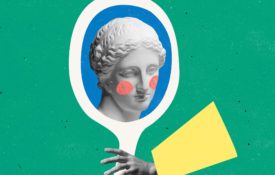-
Online Talk Therapy Works as Well as an In-Person Session, a New Study Shows
Talking to your therapist over Zoom is as helpful for anxiety and depression as going to in-person therapy. The virtual session, moreover, can be delivered at any lower cost, according to a large new study conducted in the U.K. Online therapy has become more and more prevalent since the COVID pandemic, when lockdowns forced lots of therapists online. The new study suggests that one of the biggest benefits of virtual therapy may be that it can allow people to get treatment faster, which increases their quality of life and reduces the amount of additional medical care they require—and thus cuts costs overall.
-
The ‘Mandela Effect’ Describes the False Memories Many of Us Share. But Why Can’t Scientists Explain It?
Does Mr. Monopoly wear a monocle? Is there a black stripe on Pikachu’s tail? And does the fruit in the Fruit of the Loom logo pour out of a cornucopia? If you answered yes to any of these questions — sorry, you’re wrong. But you might also be experiencing the so-called Mandela Effect. Paranormal researcher Fiona Broome coined the name in 2009 after becoming convinced that then-South African President Nelson Mandela had died in prison in the 1980s. But Mandela did not die in prison; he was released in 1990, went on to lead South Africa and died in 2013. However, Broome noticed that many others seemed to share the same inaccurate memory, prompting further investigation.
-
The SATs Will Be Different Next Year, and That Could Be a Game-Changer
A few years ago, I started asking lecture halls filled with students to raise their hands if they had run out of time on the SAT. In each room, nearly every hand went up. I was surprised, but I shouldn’t have been. For decades, educators have seen speed as a marker of aptitude or mastery, forcing students to scramble to finish tests. But a race against the clock doesn’t measure knowledge or intelligence. It assesses the much narrower skill of how well students reason under stress. As a result, timed tests underestimate the capabilities of countless students. New evidence shows that although smarter people are faster at solving easy problems, they’re actually slower to finish difficult ones.
-

New Content From Perspectives on Psychological Science
A sample of research on assessing autism in hard-of-hearing youths, the relationship between parenting and self-control, managing fear during pandemics, how expectations modulate pain, and much more.
-

In the “I” of the Beholder: People Believe Self-Relevant Artwork is More Beautiful
Our feelings about art may be more personal than previously realized, causing us to prefer art that speaks to our sense of self.
-
Rosh Hashana Can Change Your Life (Even if You’re Not Jewish)
Celebrating a new year — as Jews the world over will do this week, when Rosh Hashana begins on Friday at sunset — is all about making changes. It’s a time for new beginnings, for wiping the slate clean and starting over from scratch. In that spirit, on Rosh Hashana Jews say prayers and listen to readings that celebrate the creation of the world and of human life. But Rosh Hashana also strikes a different, seemingly discordant note. Unlike so many other New Year’s traditions, the Jewish holiday asks those who observe it to contemplate death.

